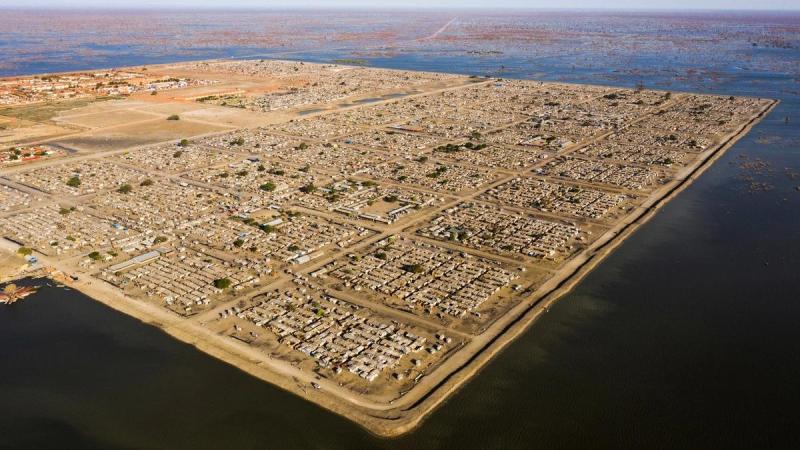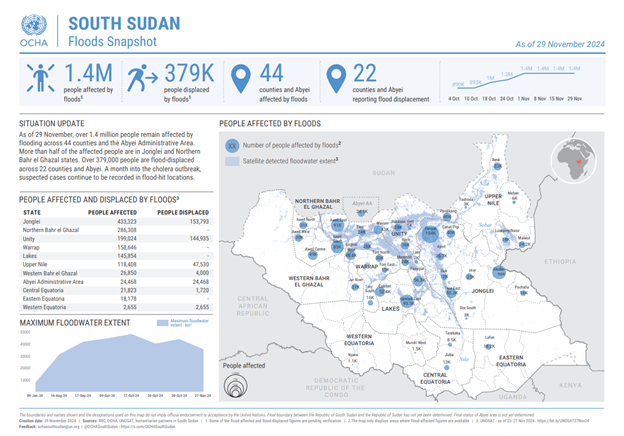

Image: Four years of historic rains have submerged farmlands, ancestral homes and roads, turning the main IDP camp in Bentiu into an island hemmed in by dykes. UNHCR / Andrew McConnell
South Sudan is among the most climate-vulnerable countries in the world. Climate change-related extreme weather events, such as droughts and floods, are exacerbating local conflict dynamics, displacing communities, eroding livelihoods, and increasing competition for limited resources.
When record-breaking floods swept through South Sudan in 2024, over 1.4 million people were affected and 380,000 displaced1. Entire communities, schools, and health facilities were submerged, just as political tensions and insecurity deepened across the country. In the face of these overlapping crises and ahead of this year’s rainy season, the Climate Security Mechanism (CSM) convened a UN Community of Practice on Climate, Peace & Security (CPS) meeting dedicated to flood preparedness and response in South Sudan. The meeting brought together Johnson Nkem, Climate, Peace and Security Advisor to the UN Mission in South Sudan (UNMISS) and Felix Omunu, Head of the Planning and Strategic Coordination Unit at the UN Office for the Coordination of Humanitarian Affairs (OCHA) in South Sudan. They shared how their teams collaborated to integrate climate and conflict analysis into humanitarian action, highlighting how UNMISS and the UN Country Team (UNCT) joined forces with development partners, academic and research institutions to co-lead a conflict-sensitive response and mitigate climate-related peace and security risks.
Severe flooding is anticipated again in 2025, coupled with an evolving and challenging political and security context in the country, making this discussion around lessons learned on the flood response particularly timely. This Community of Practice session focused on consolidating lessons from the 2024 flood response, sharing innovative approaches to integrating climate, peace and security considerations and identifying forward-looking recommendations to inform interagency preparedness and coordination for the anticipated 2025 flooding season. It provided a platform for the UN and partners to reflect on best practices, operational challenges, and opportunities to strengthen whole-of-system responses in fragile and conflict-affected contexts.

United for Resilience: Coordinated UN Action Strengthens Flood Response in South Sudan
UNMISS and the UN Country Team worked closely with national authorities to embed climate-security risk assessments into South Sudan’s 2024 National Flood Preparedness and Response Plan, developed by the National Flood Preparedness and Response Taskforce, co-chaired by OCHA and the South Sudan Ministry of Humanitarian Affairs. This collaboration ensured the plan addressed not only humanitarian and logistical needs but also the prevention and mitigation of conflict risks exacerbated by flooding. At the sub-national level, the CPS Advisor and his team supported state and county flood taskforces—including in critical areas like Bentiu—by providing analysis, extensive sensitization and awareness raising activities among local authorities and communities regarding flood dynamics, and the strategic use of high grounds for self-relocation.
To read the full article, please head over to its original place of publishing un.org/climatesecuritymechanism